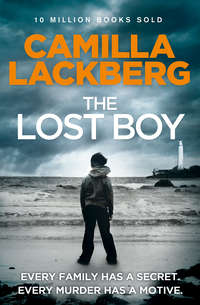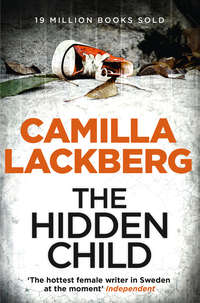
Полная версия
Buried Angels
Chapter Five

Patrik had gathered his colleagues to discuss the case. It was important that Mellberg be brought up to date. He cleared his throat. ‘You weren’t here over the weekend, Bertil, so I’m wondering whether you heard about what happened.’
‘No, tell me,’ demanded Mellberg, looking at Patrik.
‘On Saturday there was a fire out at the summer camp on Valö. There are indications that it was started deliberately.’
‘Arson?’
‘We haven’t had it confirmed yet. We’re waiting for the report from Torbjörn,’ said Patrik. He hesitated for a moment before going on. ‘But there’s enough evidence to indicate that we should keep working on the case.’
Patrik pointed to Gösta, who was standing at the whiteboard, holding a marker in his hand.
‘Gösta has taken out the files on the family that disappeared on Valö. He—’ Patrik began before being interrupted.
‘I know the case you’re talking about. Everybody knows that old story. But what does it have to do with this?’ said Mellberg. He leaned down to pet his dog Ernst, who was lying under his chair.
‘We’re not sure.’ Patrik was already feeling tired. He always had to run things past Mellberg, who was officially in charge of the station, although in practice he was more than willing to let Patrik assume full responsibility. So long as he could take full credit when the case was solved. ‘We’re going into the investigation without any preconceived notions. But it does seem very strange that this should happen just as the sole surviving member of the family, the daughter, returns to the island for the first time in thirty-five years.’
‘They probably set the house on fire themselves. To get the insurance money,’ said Mellberg.
‘I’m looking into their finances,’ said Martin, who was sitting next to Annika. He seemed unusually subdued. ‘I should have something to report by tomorrow morning.’
‘Good. I’m sure that will solve the mystery. Most likely they found out it was going to cost too much to renovate that old eyesore, so they decided it would make more sense to burn it down. I saw a lot of that during my days in Göteborg.’
‘As I said, we’re not going to lock ourselves into any specific theory at the moment,’ said Patrik. ‘Now I think we should let Gösta tell us what he remembers.’
He sat down and nodded for Gösta to begin. What Erica had told him during their boat trip through the archipelago was fascinating. Now he wanted to hear what Gösta could tell them about the old investigation.
‘I’m sure that all of you are familiar with the case, but if you don’t mind I’ll start from the beginning.’ Gösta looked around, and everybody seated at the table nodded their agreement.
‘On 13 April 1974, the night before Easter Sunday, somebody rang the police in Tanum and told them to come out to the boarding school on Valö. The caller hung up before explaining what had happened. The old police chief took the call, and according to him, it was impossible to tell whether the informant was male or female.’ Gösta paused for a moment as in his mind he was carried back to that time in the past. ‘My colleague Henry Ljung and I were told to head out there and find out what was going on. Half an hour later we arrived on the scene and found something strange. The table in the dining room was set for Easter lunch and the food had been partially eaten, but there was no trace of the family that lived there. The only person present was a one-year-old girl, Ebba, who was toddling around all alone. It was as if the rest of the family had gone up in smoke. As if they’d stood up in the middle of the meal and vanished.’
‘Poof!’ said Mellberg. Gösta gave him a withering glare.
‘Where were all the pupils?’ asked Martin.
‘Since it was the Easter holiday, most of them had gone home to their families. Only a few were still on Valö, and they were nowhere in sight when we arrived, but after a while five boys turned up on a boat. They said they’d been out fishing for a couple of hours. During the following weeks, we questioned them intensely, but they didn’t know anything about what happened to the family. I talked to them myself, and they all said the same thing: they hadn’t been invited to the family’s Easter lunch, so they’d gone out fishing instead. When they left, everything was perfectly normal.’
‘Was the family’s boat still tied to the dock?’ asked Patrik.
‘Yes. And we went over the island with a fine-tooth comb, but there was no trace of them.’ Gösta shook his head.
‘How many people are we talking about?’ Against his will, Mellberg’s curiosity had been aroused, and he was leaning forward to listen.
‘There were two adults and four children in the family. One of the children was little Ebba, of course. So the adults and three children disappeared.’ Gösta turned to write on the whiteboard. ‘The father, Rune Elvander, was the headmaster of the school. He was a former military man, and it was his idea to establish a school for boys whose parents set high standards for education, combined with strict discipline. First-class teaching, character-building rules, and invigorating outdoor activities for well-to-do boys. That was how the school was described in the brochure, if I remember correctly.’
‘Jesus, that sounds like something out of the 1920s,’ said Mellberg.
‘There have always been parents who long for the good old days, and that was exactly what Rune Elvander offered,’ said Gösta, and then resumed his report. ‘Ebba’s mother was named Inez. She was twenty-three years old at the time of her disappearance, significantly younger than Rune, who was in his fifties. Rune also had three children from a previous marriage: Claes, who was nineteen; Annelie, who was sixteen; and Johan, who was nine. Their mother, Carla, died a year before Rune remarried. According to the five pupils, there seemed to be a number of problems in the family, but that was all we managed to get out of them.’
‘How many pupils were attending the boarding school when they weren’t away on holiday?’ asked Martin.
‘It varied a bit, but about twenty. In addition to Rune, there were two other teachers, but they’d gone home for Easter.’
‘And I assume they had alibis for the time the family disappeared, right?’ Patrik said, looking at Gösta.
‘Yes, they did. One of them was visiting relatives in Stockholm to celebrate Easter. At first we were a little suspicious of the other teacher, because he kept making excuses and didn’t want to tell us where he’d been. But it turned out that he’d gone off with a boyfriend to some sunny holiday destination, and that was the reason for all the secrecy. He didn’t want anyone to find out that he was gay. He’d been so careful to hide the fact at school.’
‘What about the students who’d gone home for the holidays? Did you check up on all of them?’ asked Patrik.
‘Every single one of them. And their families confirmed that the boys had spent Easter at home and hadn’t been anywhere near the island. And by the way, all of the parents seemed pleased with the effect that the school was having on their children. They were extremely upset that they wouldn’t be able to send them back to the boarding school. I had the impression that many of the parents considered it bothersome having the boys at home even for the holiday.’
‘Okay. And you didn’t find any physical evidence to indicate what might have happened to the family?’
Gösta shook his head. ‘Of course, we didn’t have the equipment and the expertise that’s available today, so that factored into the technical investigation. But everybody did the best they could, and there was nothing. Or rather: we found nothing. But I’ve always had a feeling that we missed something, though I could never put my finger on what that might be.’
‘What happened to the little girl?’ asked Annika, whose heart went out to any child in trouble.
‘There were no living relatives, so Ebba was placed with a foster family in Göteborg. As far as I know, they later adopted her.’ Gösta paused for a moment, looking down at his hands. ‘I have to say that we did a good job. We investigated every possible lead and tried to form some idea of a motive. We poked around in Rune’s past but found no skeletons in the closet. We knocked on doors all over Fjällbacka, to find out if anyone had seen anything out of the ordinary. We tackled the case from every imaginable angle, but never made any headway. Without proof, it was impossible to work out whether they’d been murdered or kidnapped or had simply left voluntarily.’
‘Fascinating,’ said Mellberg, clearing his throat. ‘But I still don’t understand why we need to revive this old case. There’s no reason to complicate matters unnecessarily. Either this Ebba and her husband set the fire themselves, or some kids decided to get up to mischief.’
‘Don’t you think it seems to involve more sophisticated planning than the sort of thing a bunch of bored teenagers would do?’ said Patrik. ‘If they wanted to burn down a building, it would be a lot simpler to start a fire in town than to go out to Valö in a boat. And as we mentioned, Martin is looking into whether this might have involved insurance fraud. But the more I hear about the old case, the stronger my gut feeling is that the fire is connected to what happened when that family disappeared.’
‘You and your gut feelings,’ said Mellberg. ‘There’s nothing concrete that points to a connection. I know that you’ve been right a few times in the past, but in this instance, I reckon you’re way off the mark.’ Mellberg got up, clearly pleased at delivering what he considered the truth of the day.
Patrik shrugged, letting his boss’s remarks roll right off him. He’d long since stopped taking Mellberg’s opinion into consideration. In fact, he’d never really bothered with Mellberg’s view. So he assigned the various tasks to his colleagues and ended the meeting.
On his way out of the room, Martin pulled Patrik aside.
‘Could I have the afternoon off? I know it’s short notice, but …’
‘Sure, of course you can if it’s important. What’s it about?’
Martin hesitated. ‘It’s a personal matter. I’d rather not talk about it just now. Is that okay?’
There was something in his tone of voice that stopped Patrik from asking any more questions, but he was hurt that Martin didn’t want to confide in him. He thought they had formed such a close relationship during the years they’d worked together that Martin should feel comfortable telling him if anything was wrong.
‘I can’t talk about it,’ said Martin, as if he guessed what Patrik was thinking. ‘So is it okay if I leave after lunch?’
‘Of course. No problem.’
Martin gave him a faint smile and turned to go.
‘But I’m here if you want to talk,’ said Patrik.
‘I know that.’ Martin hesitated, but then headed off down the hall.
As she made her way down the stairs, Anna already knew what she’d see in the kitchen. Dan would be sitting at the table, wearing an old bathrobe and deeply engrossed in the morning newspaper, holding a cup of coffee in his hand.
When he saw her come into the room, his face lit up.
‘Good morning, sweetheart.’ He reached out for a kiss.
‘Good morning.’ Anna turned her head away. ‘I have such bad morning breath,’ she said apologetically, but the damage was done. Dan got up without a word and went over to the dishwasher to put his cup inside.
Why did it have to be so damned hard? She was always saying and doing the wrong thing. She wanted things to be good again, back to the way they used to be. She wanted to re-establish the natural relationship that they’d had before the accident.
Dan busied himself washing up the breakfast dishes, and she went over to put her arms around him, leaning her cheek against his back. But the only thing she felt in his tense body was frustration. It spread to her, making her desire for closeness disappear, at least for now. It was impossible to say whether the occasion would present itself again.
With a sigh she let go of Dan and sat down at the kitchen table.
‘I need to get back to work,’ she said, picking up a slice of bread and reaching for the butter knife.
Dan turned and leaned against the counter with his arms folded.
‘What kind of work?’
Anna hesitated before saying, ‘I’d like to run my own business.’
‘That’s a great idea! What sort of business? A shop? I could check around to see what’s available.’
Dan gave her a big smile, but somehow his eager response dampened her own enthusiasm. This was her idea, and she didn’t want to share it. She couldn’t explain why.
‘I want to do this myself,’ she said, noticing the sharp tone of her voice.
The joy instantly vanished from Dan’s face.
‘Sure, go ahead,’ he said, going back to clattering the dishes.
Shit, shit, shit. Anna silently cursed herself, clenching her hands into fists.
‘I’ve been thinking about opening a shop. But I’ll need to do all the furnishing myself, go sourcing antiques, and things like that.’ The words spilled out as she tried to recapture Dan’s attention. But he was making a lot of noise, washing the glasses and plates, and he didn’t respond. His back seemed rigid and unforgiving.
Anna set the slice of bread down on her plate. She’d lost her appetite.
‘I’m going out for a while,’ she said, getting to her feet and heading out of the kitchen to go upstairs and get dressed. Dan still didn’t say a word.
‘How nice that you could join us for a spot of lunch,’ said Pyttan.
‘A pleasure to come over here and see how the other half lives.’ Sebastian laughed and gave Percy such a hard slap on the back that he coughed.
‘Well, you’re not exactly living in poverty.’
Percy smiled to himself. Pyttan had never made it a secret what she thought of Sebastian’s ostentatious mansion with the two pools and tennis court. The house may have been smaller in size than Fygelsta manor, but it was much more lavish. ‘Money can’t buy taste,’ Pyttan used to say after they’d visited, turning up her nose at the gleaming gilded frames and the enormous crystal chandeliers. Percy was inclined to agree.
‘Come and sit down,’ he said, ushering Sebastian to the table that had been set for lunch out on the terrace. At this time of year Fygelsta was unbeatable. The beautiful park stretched as far as the eye could see. For generations it had been meticulously tended, but it wouldn’t be long before it would fall into neglect, just as the manor had done. Until he had worked out their finances, they would have to make do without gardeners.
Sebastian sat down and leaned back in his chair, his sunglasses pushed up on his forehead.
‘Some wine?’ Pyttan held out a bottle of first-class Chardonnay. Much as she disliked the thought of asking Sebastian for help, Percy knew that his wife would do her utmost to support him now that the decision had been made. It wasn’t as if they had any other option.
She filled Sebastian’s glass. Oblivious to the fact that it was her prerogative, as the hostess, to welcome her guest before he started eating, Sebastian immediately launched himself at the appetizer. He shovelled in a big forkful of shrimp salad with dill and began chewing with his mouth open. Percy saw Pyttan turn away in disgust.
‘So you’re having a little problem with your taxes, is that right?’
‘Yes, it’s a mess. I don’t know what to say.’ Percy shook his head. ‘Nothing seems sacred any more.’
‘How true. It doesn’t pay to work in this country,’ said Sebastian.
‘No, things were different in Pappa’s day.’ Percy began eating his food, after first giving Pyttan an enquiring glance. ‘You’d think people would appreciate the fact that we’ve put so much work into taking care of this cultural monument. It’s a piece of Swedish history, and our family has borne the brunt of preserving it, and we’ve done it with honour.’
‘True. But times have changed,’ said Sebastian, waving his fork. ‘The winds of social democracy have been blowing for a long time now, and it doesn’t seem to help that we’ve got a conservative government. Nobody’s allowed to have more than his neighbour. If you do, those bastards will take away everything you own. I’ve been through it all myself. Had to pay a lot in back taxes this year, but luckily only on what I have here in Sweden. You’ve got to be smart and put your assets abroad, where the tax authorities can’t get their hands on everything you’ve worked so hard to acquire.’
Percy nodded. ‘Indeed. Naturally. But so much of my capital has always been invested in the manor.’
He wasn’t stupid. He knew full well that Sebastian had exploited him over the years. He’d often allowed Sebastian to borrow the manor for meetings with his customers for hunting parties, or for entertaining his countless mistresses. He wondered whether Sebastian’s wife suspected anything, but that was none of his business. Pyttan kept him on a tight rein, and personally he would never dare try something like that. But he wasn’t about to criticize how other married people behaved.
‘Still, you must have got a sizeable inheritance from your old man?’ said Sebastian as he held up his empty wine glass towards Pyttan. Without revealing so much as a hint of what she was thinking, she picked up the bottle and filled his glass to the brim.
‘Yes, but you know …’ Percy shifted uncomfortably on his chair. He had a deep aversion to discussing money. ‘It costs a fortune to keep the place running properly, and the cost of living keeps going up. Everything is so expensive nowadays.’
Sebastian grinned. ‘The cost of living is definitely on the rise.’
He was blatantly scrutinizing Pyttan, from her costly diamond earrings to her Louboutin high heels. Then he turned to Percy.
‘So what is it you need help with?’
‘Well …’ Percy hesitated, but after casting a glance at his wife, he gathered his courage. He had to resolve the situation, otherwise he’d have to start investigating other options. ‘You see, it’s a matter of a short-term loan.’
A weighty silence followed, but it didn’t seem to bother Sebastian. A little smile played over his lips.
‘I have a suggestion,’ he said then. ‘But I think we should discuss it alone, just the two of us, as old classmates.’
Pyttan was about to protest, but Percy gave her a stern look, which was unusual for him, so she didn’t say a word. His eyes met Sebastian’s and the words flew soundlessly between them.
‘That would probably be best,’ he said, lowering his gaze.
Sebastian smiled broadly. Once again he held out his glass to Pyttan.
It was too hot to be climbing about on the facade when the sun was at its zenith, so during the middle of the day they worked indoors.
‘Shall we start with the floor?’ asked Tobias as they stood in the dining room.
Ebba tugged at a loose scrap of wallpaper and a big piece came off with it. ‘Wouldn’t it be better to do the walls first?’
‘I’m not sure the floor is going to hold. A lot of the boards are rotting in places. I think we should fix that before we do anything else.’ He pressed his foot down on a floorboard, which gave way under his shoe.
‘Okay. We’ll do the floor,’ said Ebba, putting on her protective glasses. ‘How do we go about it?’
She wasn’t afraid of hard work, and she was perfectly willing to put in as many hours as Tobias. But he was the one who had experience of this type of thing, and she had to rely on his expertise.
‘A sledgehammer and a crowbar should do the trick. I’ll take the sledgehammer and you can use the crowbar, okay?’
‘Fine.’ Ebba reached for the tool that Tobias handed her. Then they got started.
She could feel the adrenalin flowing, and she noted with pleasure the burn in her biceps when she stuck the crowbar in the gaps between the planks and pulled up the wood. As long as she pushed her body to its limit, she didn’t have to think about Vincent. When the sweat poured out and the lactic acid filled her muscles, she was free for a brief time. She was no longer Vincent’s mother. She was Ebba, who was fixing up her inherited property, who was breaking it apart and then renovating it.
Nor did she think about the fire. If she closed her eyes, she was reminded of the panic, the smoke stinging her lungs, the heat that made her realize how it must feel to be burned alive. And she remembered the wonderful feeling of finally surrendering.
Then with her eyes fixed straight ahead, and using more strength than was necessary to loosen the rusty nails from the underlying joists, she forced herself to concentrate on the task at hand. But after a while thoughts began crowding in. Who would want to hurt them and why? As she worked, the questions kept whirling through her mind, leading nowhere. She couldn’t think of anyone. They were the only ones who might mean to harm themselves. She had often thought that it would be better if she was dead, and she knew that Tobias had thought the same about himself. But everyone they knew had showed them nothing but compassion. There was no ill will, no hatred, only sympathy for what they’d been through. At the same time, there was no escaping the fact that somebody had been sneaking around in the dark, trying to burn down the house with them inside. Unable to drive the thoughts from her mind, she stopped to wipe the sweat from her forehead.
‘It’s too damned hot in here,’ said Tobias, slamming the sledgehammer against the floor, making small pieces of wood fly in all directions. He’d taken off his T-shirt, fastening it to his carpenter’s belt.
‘Watch out that you don’t get something in your eye.’
Ebba studied his body in the sunlight flooding through the dirty windows. He looked exactly the same as when they first got together. A lean, sinewy body which, in spite of all the hard manual labour, never seemed to acquire any muscles. She, on the other hand, had lost her womanly curves over the past six months. Her appetite had completely disappeared, and she must have dropped more than twenty pounds. She didn’t know for sure, since she never bothered to weigh herself.
They worked for a while in silence. A fly buzzed angrily against a pane, and Tobias went over and threw the window wide open. Outside there wasn’t a breath of wind, so it gave them no relief, but the fly was able to slip out and they were rid of the constant buzzing.
The whole time they were working, Ebba was aware of what had once been. The history of the house was in its walls. She pictured all the children who had come out here to spend the summer at camp, for the sake of fresh air and good health, as it said in the article in an old issue of Fjällbacka-Bladet that she’d found. The house had had other owners too, including her father, but it was mostly the children that she thought about. What an adventure it must have been to leave their parents behind and come out here to stay with children they didn’t know. Sunny days and swimming in salt water, rules and regulations mixed with games and commotion. She could hear their laughter but also their cries. The article had mentioned a report of abuse too, so maybe everything hadn’t been so idyllic. Sometimes she wondered whether the cries came only from the summer camp, or whether her own feelings about the house had got mixed in with other memories. There was something alarmingly familiar about those cries, but she had been very young when she lived here. These memories, if that was what they were, had to belong to the house itself, not to her.
‘Do you think we’ll be able to manage?’ asked Tobias, leaning on the sledgehammer.
Lost in her own thoughts, Ebba jumped at the sound of his voice alongside her. He grabbed the T-shirt hanging from his belt and used it to wipe his face. Then he looked at her. She didn’t want to meet his eyes. Instead, she gave him a furtive glance as she continued to work on a board that was refusing to come up. He made it sound as if he was talking about the renovation, but she realized that his question encompassed much more than that. And she had no answer for him.









